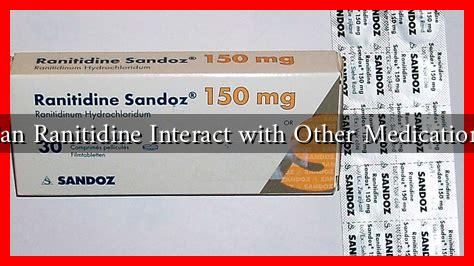-
Table of Contents
Can Ranitidine Interact with Other Medications?
Ranitidine, a medication commonly used to treat conditions like gastroesophageal reflux disease (GERD) and peptic ulcers, belongs to a class of drugs known as H2-receptor antagonists. While effective in reducing stomach acid, it is crucial for patients and healthcare providers to understand the potential for drug interactions. This article explores how ranitidine can interact with other medications, the implications of these interactions, and what patients should be aware of.
Understanding Ranitidine
Ranitidine works by blocking histamine H2 receptors in the stomach lining, thereby decreasing the production of stomach acid. It is often prescribed for:
- Gastroesophageal reflux disease (GERD)
- Peptic ulcers
- Zollinger-Ellison syndrome
- Prevention of stress ulcers in critically ill patients
Despite its effectiveness, ranitidine has been under scrutiny due to safety concerns, particularly regarding its potential contamination with N-nitrosodimethylamine (NDMA), a probable human carcinogen. As of 2020, the FDA requested the withdrawal of all ranitidine products from the market. However, understanding its interactions with other medications remains essential for those who may still be using it or similar alternatives.
Potential Drug Interactions
Ranitidine can interact with various medications, affecting their efficacy and safety. Here are some notable interactions:
- Antacids: Taking antacids simultaneously with ranitidine can reduce the absorption of ranitidine itself, leading to decreased effectiveness.
- Warfarin: Ranitidine may enhance the anticoagulant effect of warfarin, increasing the risk of bleeding. Regular monitoring of INR levels is recommended.
- Ketoconazole: This antifungal medication requires an acidic environment for absorption. Ranitidine can reduce stomach acidity, potentially leading to decreased absorption of ketoconazole.
- Digoxin: Ranitidine may increase the absorption of digoxin, which can lead to toxicity if not monitored closely.
- Procainamide: Ranitidine can increase the levels of procainamide, a medication used for heart rhythm disorders, leading to potential toxicity.
Case Studies and Statistics
Several studies have highlighted the importance of monitoring drug interactions involving ranitidine. For instance, a study published in the Journal of Clinical Pharmacology found that patients taking ranitidine alongside warfarin had a significantly higher risk of bleeding complications compared to those not on ranitidine. This underscores the need for healthcare providers to evaluate a patient’s complete medication list before prescribing ranitidine.
Another study indicated that patients taking ranitidine with digoxin experienced elevated digoxin levels, necessitating dose adjustments and careful monitoring. These findings emphasize the critical nature of understanding drug interactions in clinical practice.
What Patients Should Know
Patients prescribed ranitidine or similar medications should be proactive in discussing their entire medication regimen with their healthcare provider. Here are some tips:
- Always inform your doctor about all medications you are taking, including over-the-counter drugs and supplements.
- Monitor for any unusual symptoms or side effects, especially if you are on medications like warfarin or digoxin.
- Consult your healthcare provider before starting any new medications, including herbal supplements.
- Regularly review your medication list with your healthcare provider to ensure safety and efficacy.
Conclusion
While ranitidine has been an effective treatment for various gastrointestinal conditions, its potential interactions with other medications cannot be overlooked. Understanding these interactions is vital for ensuring patient safety and optimizing therapeutic outcomes. As the landscape of medication safety continues to evolve, patients and healthcare providers must remain vigilant in monitoring and managing potential drug interactions. Always consult with a healthcare professional before making any changes to your medication regimen.

